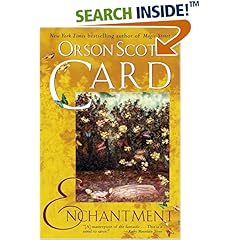Enchantment, Orson Scott Card
 There were a lot of things about this book that perhaps should have made me not like it: the deliberate Christian/Jewish/Pagan syncretism, the use of "good" witchcraft, the disocvery of one's true love after getting engaged to someone else, the verging into areas a little more personal than perhaps should be put into print.
There were a lot of things about this book that perhaps should have made me not like it: the deliberate Christian/Jewish/Pagan syncretism, the use of "good" witchcraft, the disocvery of one's true love after getting engaged to someone else, the verging into areas a little more personal than perhaps should be put into print.Nonetheless I loved it for its whole self. Well, it was a fairy tale, and a fairy tale is by nature a mix of Christian ideals with stories far older. And although it dealt with some private matters, it never resorted to being vulgar or gratuitous.
A key difference between the ancient pagan stories and the medieval fairy tale is a shift in the hero. The ancient hero is always the son of a god or a mighty king. The fairy tale hero is more likely the miller's third son, the notorious dunce. In a fairy tale, the meek do inherit the earth. In Enchantment, it is the nerdy scholar who defeats the monster and wins the princess' hand, though he seems ill-suited to the task in his own world and in the tenth century. Asserting power merely plays into the enemy's hands; it is virtue and truth and life that must win out. So though it has pagan powers and a Jewish hero, it is ultimately a Christian tale. We are the unworthy ones who find ourselves chosen to inherit the kingdom.


4 Comments:
Yes, it surprised me how much I enjoyed this book despite everything you cite. The worst parts, for me, were the Baby Yaga interludes, which I did find repulsive and disturbing. The other TMI parts didn't jar on me so much, although I certainly couldn't recommend the book to minors for those reasons.
I love all the historical and literary and esoteric linguistical references throughout the book, all woven in so effortlessly that you don't think, 'My word, what a LOT of research this author must have done for this book!' For days after reading this I dreamt of fairy tales and old scripts. The time travel element was wonderfully done, as well.
I love the dialogue:
'Are you joking, or just simple in the head?' asked the king.
'Simple in the head,' answered Ivan promptly.
Ha, yes, and the part where the priest points out "There's no part of the [wedding] ceremony where the priest, acting in the place of God, warns the guests not to kill the bridegroom because it might jeopardize the succession."
It was odd because I didn't think of the book as a funny one, until DOB commented on how much I had been laughing. The wit is dry, but very good.
I just finished this book. Towards the end I started thinking about Lewis and how he wove morals into his stories and was CONVINCED Card was doing the same -- but I couldn't formulate a workable allegory in my mind. After I finished it, I did some online research on Card. Turns out he is a rather strong member of the LDS church which makes more sense out of his writings.
I'm really split as to whether or not I liked this book. Like QOC, I found myself laughing outloud quite a bit. Love the wit. At the same time, so much of it was (I felt) unnecessarily graphic which rather spoils things for me. It's definitely NOT something I'd let J2 read ANYtime soon. I'd rather he not pick it up for a long, long time actually! Which makes me think I shouldn't like it myself. In full or in part. But I did. In some capacity at any rate!
I enjoyed the story, finding it imaginative and adventuresome. It certainly follows the classic story arc: After much physical danger and relational tensions, the lovers are united (and it was refeshing to see the romance developing after they were already married!), the kingdom saved, and the powers of evil dismantled.
But I, too, was bothered by the equal footing given to Chrisitanity, Judaism, sorcery, and tribal deism. It was rather jarring, actually. But the story did pose some interesting ideas about the origins of myths and fairy tales, and of the superstitions and pantheistic beliefs of ancient/medieval societies, and how the Church had to overcome these.
I make it sound like the book was weighty with these themes and conflicts; but it really wasn't. First and foremost it was a romance, as well as a time-travel fantasy and adventure. It was fast-paced, with colorful characters, and for these reasons I enjoyed the book. Definitely for mature readers only, however!
Post a Comment
<< Home